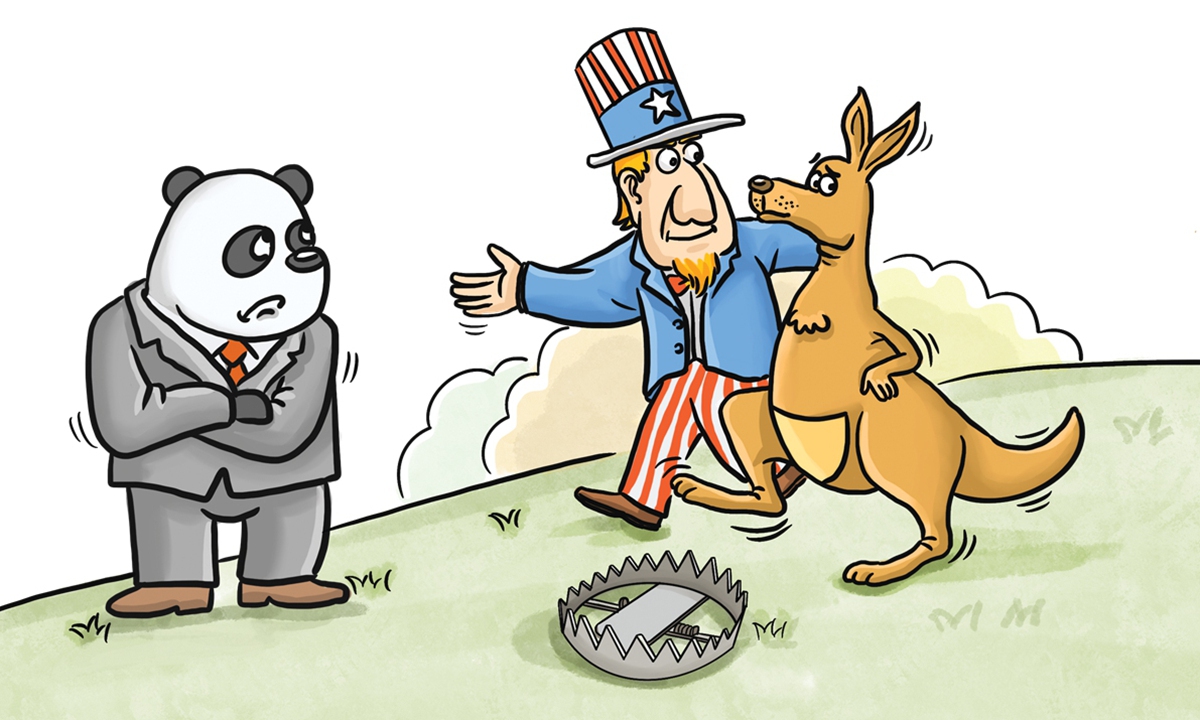
Illustration: Xia Qing/GT
In geopolitics, it appears that countries that frequently mention "coercion" are often the ones most skilled at using it. This has been proven again during the recent Australia-US Ministerial Consultations (AUSMIN).
The US and Australia convened for AUSMIN on Tuesday. US Defense Secretary Lloyd Austin highlighted that the bilateral discussions covered several contentious topics, including China's "coercive behavior." Additionally, he announced the US' plan to enhance "the presence of rotational US Forces in Australia" and increase "more frequent rotational bomber deployments" to the country.
These moves, under the banner of "security cooperation," are aimed at positioning Canberra at the forefront of Washington's geopolitical strategy and constitute a provocation in the Asia-Pacific region.
The term "concern" appeared approximately 14 times in the joint statement after the US-Australia meeting, intending to portray a tense and volatile atmosphere in the region. While the US blatantly alleged China's "coercive behavior," this narrative serves to advance its ultimate goal of the Indo-Pacific Strategy. By portraying China as a threat, the US aims to justify its provocative actions in the region. Such tactics, reminiscent of the crying wolf, are characteristic of hegemonic nation manipulating its allied states.
Using the label of China's "coercive behavior" to prompt Australia into the forefront of the US overseas military deployments is a typical illustration of US Indo-Pacific strategy. In addition to the hype of the "China threat" during the AUSMIN, it was reported by the Reuters that the Cocos Islands of Australia, a remote island close to an Indian Ocean chokepoint for Chinese oil shipments, is on a list of possible locations for US military construction aimed at deterring China.
"The US' military deployment in the Cocos Islands serves two primary purposes," Chen Hong, director of the Australian Studies Center at East China Normal University, told the Global Times. "It aims to monitor the Chinese navy, particularly submarines, and intends to present a deterrence against China," the expert said. The role of these islands already illustrates the US' hidden agenda in militarizing Australia, positioning it as a frontline against China, whether for surveillance or in preparation for potential conflicts.
The US military build-up in Australia is undeniable evidence of its use of the country as a geopolitical pawn. These deployments are not motivated by concern for Australia's security needs but by US' pursuit of global strategic interests. This approach places Canberra in a precarious position of competing blindly for Washington's interests, potentially compromising its neutrality and independence in international affairs.
"Following increased US military deployment in Australia, its role has shifted from being a 'southern anchor' to a 'southern spear,'" said Chen. The first pillar of AUKUS, the construction of nuclear-powered submarines for Australia, aims to enhance the country's military capability for long-range strikes, which means US bases in Australia are no longer confined to defensive purposes.
The US harbors sinister intentions in militarizing Australia, luring allies like Australia to spearhead its hegemonic interests, which poses grave financial and security risks for the country, Chen added.
US instigation will only heighten Australia's security risks, fostering excessive reliance on external military power. By leveraging supposed "regional threats" to coerce Australia into accepting military deployments, the US' true objective is to manipulate Australia as a tool against China. This deserves Australia's vigilance.
Australia's natural geographic advantages could enable it to contribute constructively to regional peace and stability through an independent foreign policy. With significant geographical distance from China and no historical or territorial disputes, Australia faces no inherent threat from China.
Notably, Austin's direct accusation of "Chinese coercion" did not feature prominently in the US-Australia joint statement. This suggests Australia acknowledges the importance of not fully aligning with US' confrontational approach toward China at the expense of cooperation and friendship with China.
The recent thaw in China-Australia relations is a positive development. The Australian government should maintain rationality and composure, resisting the pressure to forsake its independent strategy and diplomacy.
Only by doing so can Australia effectively protect its national interests and sovereignty, preventing it from becoming a pawn in US geopolitical strategies and ensuring that its relationship with China is not sacrificed to US hegemonic ambitions.




